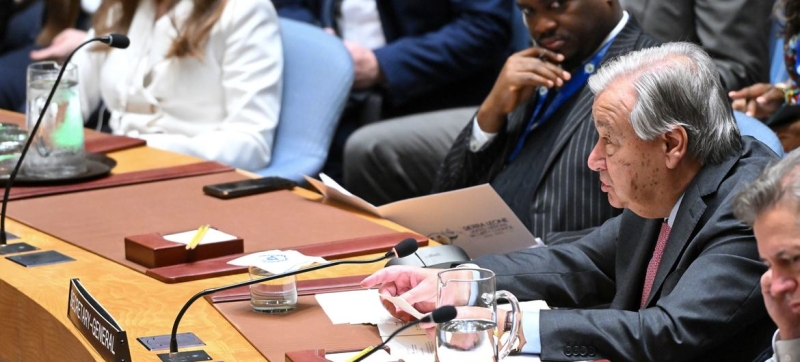
Antonio Guterres at the Security Council meeting. Guterres: “I firmly believe that peace is possible” Peace and Security
Conflicts are becoming increasingly complex and affecting all regions of the world, UN Chief Antonio Guterres said at a high-level Security Council debate on “Leadership for Peace.” Council members endorsed the President’s Statement, in which they reaffirmed their commitment to international law and the UN Charter.
Countries must respect the UN Charter
Peace requires leadership and action, it will not come automatically, the Secretary-General stressed. “Instead, we are seeing deepening geopolitical divisions and mistrust. “Impunity is spreading, and international law and the UN Charter are constantly being violated,” Guterres said.
“From Gaza to Ukraine to Sudan and elsewhere, wars continue, suffering deepens, hunger increases, lives are upended and the legitimacy and effectiveness of the United Nations and this Council is undermined,” the UN chief said.
He noted that leadership for peace requires action in at least two key areas.
First, member states must fulfil their obligations under the UN Charter, international law and recent agreements such as the Future Pact.
Among other things, the Pact calls for strengthening and updating international instruments for conflict prevention and peacekeeping, including peacekeeping operations. The pact includes initiatives in the areas of disarmament, peacebuilding and combating threats posed by autonomous weapons and artificial intelligence.
It also contains proposals for reforming key global governance institutions, including the Security Council.
The Security Council must work effectively
Secondly, the Secretary-General said, leadership for peace means that the UN Security Council must work effectively and be able to ease global tensions and contribute to conflict resolution. Security Council members must act in unison, the UN chief stressed.
“Geopolitical differences continue to block effective solutions. A united Council can make a huge contribution to peace. A divided Council cannot,” Guterres said.
During the meeting on Wednesday, Council members unanimously endorsed the presidential statement, which said the Security Council was “fully aware of the responsibilities entrusted to it by the Charter of the United Nations” and was committed to carrying out its duties in the most effective manner.
“It is imperative that Council members spare no effort to work together to find common ground. And they have proven their ability to do so in some key areas,” the Secretary-General said.
Peace is possible
The Council currently oversees 11 peacekeeping operations on three continents, with nearly 70,000 peacekeeping troops deployed, the Secretary-General recalled.
The Security Council adopts resolutions that help maintain the flow of vital humanitarian aid to trouble spots and strengthens ties with regional and subregional organizations to promote consensus and peace.
“When we consider the most complex and intractable conflicts on the Council’s agenda, peace may seem like a pipe dream. But I firmly believe that peace is possible,” the UN chief said.
“Peace in Ukraine is possible if the UN Charter is followed and international law is respected. Peace in Gaza is possible if no effort is spared to ensure an immediate ceasefire, the immediate release of all hostages, and the beginning of an irreversible process toward a two-state solution. Peace in Sudan is possible,” he added. He called on all countries to support the work of the Council.
“Let us ensure that this Council serves as an effective and representative forum for achieving peace – today and in the years to come,” Guterres said.
ICRC chief: humanitarian law saves lives
“What enables people to commit atrocities in war? Horrible events throughout history are rooted in one common element: dehumanization – the process of dehumanizing others to justify violence, blunt empathy and rationalize torture, ill-treatment and murder,” Mirjana Spoljaric, President of the International Committee of the Red Cross (ICRC), told the Security Council.
Spoljaric warned that warring parties around the world were increasingly flouting their obligations under international humanitarian law (IHL) or interpreting it liberally to justify violations. She noted that this was setting dangerous precedents by normalizing violations and fueling new conflicts.
The speaker stressed that international humanitarian law saves lives and that it is not enough to pay lip service to it. States, the rapporteur noted, must take concrete measures to minimize harm, respect the principles of proportionality and ensure humanitarian access. Violations such as attacks on hospitals or blocking humanitarian aid must be condemned at the highest level, Spoljaric added.
The ICRC President reminded the Security Council that the Geneva Conventions oblige all people, including the opposing side in war, to be treated humanely. She called on world leaders to respect these agreements, warning that violating them will entail serious consequences.
